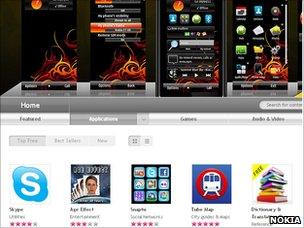Nokia kills off Ovi mobile brand
- Published

Nokia's Ovi store allows users to download games, apps and music
Nokia is to stop using the Ovi brand to sell music, games and mobile apps.
The company said it planned to wind up the four-year-old project and would be offering services under the Nokia name in future.
In its early days, critics claimed that Ovi was an ill-conceived, rushed reaction to Apple's app store and iTunes.
However, by 2011, its worldwide user base was downloading an average of five million products every day.
The changeover was announced on Nokia's Ovi, external blog by editor Pino Bonetti.
He wrote: "The main reason for this change is so we can leverage the high-value of the Nokia master brand to better support future plans to deliver disruptive and compelling mobile experiences globally."
Mr Bonetti assured users that the only change to the service would be its name.
Confusing brands
Industry watchers said that it made sense for Nokia to ditch the Ovi brand following its agreement with Microsoft to use Windows on its smartphones.
"The problem was they created a brand out of something that did not need to be branded," said Stuart Miles, editor of Pocketlint.com
"With the move to Windows Phone 7 they are not going to be able to keep the Ovi store. That was going to get very confusing."
Microsoft's Windows Phone allows users to download applications through its dedicated Marketplace store.
Although Nokia plans to use the platform for all future smartphones, the majority of the handsets it makes run on Nokia's own, less sophisticated operating system.
Software for those will continue to be made available through the rebranded Ovi platform, leading some analysts to question whether the new setup will be any simpler.
"If you are going to abandon Ovi, I would imagine you would want to have a single app store offered by both companies," said Dr Windsor Holden, a telecoms analyst with Juniper Research.
"It seems a very strange way of going about it at the present time," he added.
Business rethink
Rory Cellan-Jones asks Nokia's Stephen Elop and Microsoft's Steve Ballmer why they chose to form an alliance
Nokia has been forced to rethink its strategy in recent years as it feels the pressure from rival manufacturers.
Its global market share fell from 33% in April 2010 to 29% in April 2011, according to Strategy Analytics.
In its core business of producing low end, simple handsets, competition has come from companies such as Samsung, which recently passed the Finnish firm as the leading mobile retailer in Western Europe.
The Finnish firm's decline has been even more precipitous in the rapidly growing smartphone segment, with Apple's iPhone and Google Android-powered devices eroding its long standing dominance.
According to figures from IDC, Nokia's share of the smartphone market fell from 57% in 2009, external to 20.8% in 2011, external.
In an attempt to turn the tide, it announced a strategic alliance with Microsoft in February 2011.
Nokia said that there would be substantial job losses as a result of the deal.
- Published11 February 2011
- Published10 February 2011
- Published27 April 2011